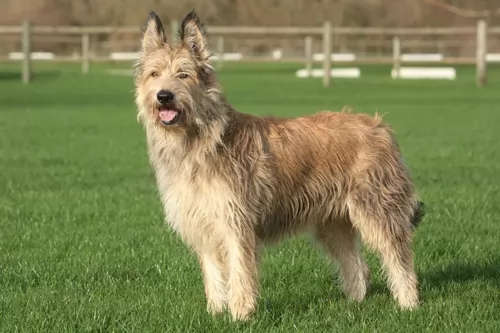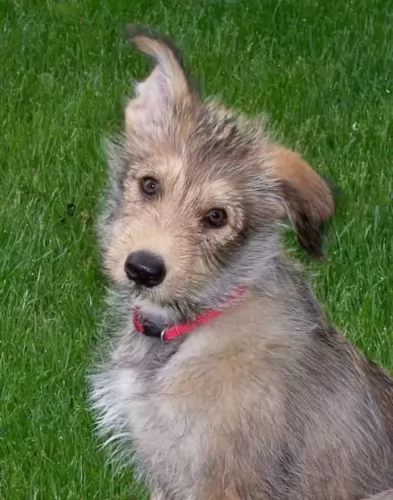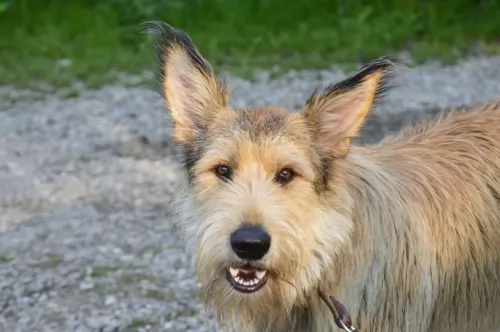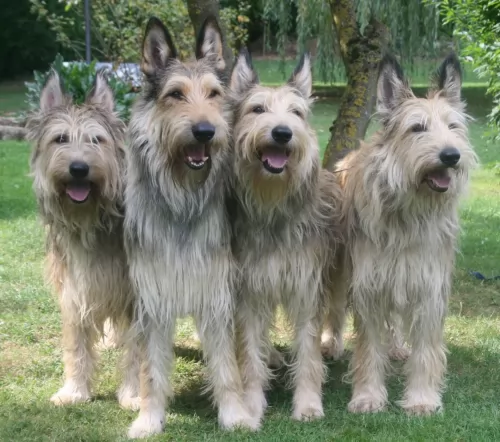 Petzlover
Petzlover Berger Picard is originated from France but Lakeland Terrier is originated from United Kingdom. Berger Picard may grow 27 cm / 11 inches higher than Lakeland Terrier. Berger Picard may weigh 24 kg / 53 pounds more than Lakeland Terrier. Both Berger Picard and Lakeland Terrier has almost same life span. Berger Picard may have more litter size than Lakeland Terrier. Berger Picard requires Low Maintenance. But Lakeland Terrier requires Moderate Maintenance
Berger Picard is originated from France but Lakeland Terrier is originated from United Kingdom. Berger Picard may grow 27 cm / 11 inches higher than Lakeland Terrier. Berger Picard may weigh 24 kg / 53 pounds more than Lakeland Terrier. Both Berger Picard and Lakeland Terrier has almost same life span. Berger Picard may have more litter size than Lakeland Terrier. Berger Picard requires Low Maintenance. But Lakeland Terrier requires Moderate Maintenance
 In the Picardie region of northeastern France saw visiting Celts/Franks enter the region along with a shepherd dog. They arrived in the Pas de Calais in 800 AD and might be the oldest shepherd dog of France. Named for Pacardy, the Berger Picard is certainly one of the most ancient of today’s French breeds. Some believe this shepherd comes from the lines of Dutch and Belgian Shepherds, while other insist he is related to the Beauceron and Briard.
In the Picardie region of northeastern France saw visiting Celts/Franks enter the region along with a shepherd dog. They arrived in the Pas de Calais in 800 AD and might be the oldest shepherd dog of France. Named for Pacardy, the Berger Picard is certainly one of the most ancient of today’s French breeds. Some believe this shepherd comes from the lines of Dutch and Belgian Shepherds, while other insist he is related to the Beauceron and Briard.
Never popular as a show dog due to its shaggy appearance, even though it was entered in Frances first dog show in 1863, the breed was almost extinct following the second World War. Currently there are a little under 5000 left in the world with most of them, 3000, in France. The Picard is a good herding dog and loved by the shepherds of the Picardy region. The United Kennel Club recognized the rare breed in 1994, but the AKC did not recognize it until 2016.
The Berger Picard is a loyal, people-oriented dog, good with children and families if socialized as a puppy. In 2006 the Berger Picard Club of America was formed as more and more dogs are being imported from France. There was a genetic study done this year that proposes that 7 breeds of shepherd all descended from a European herding dog that was all over Europe before 1859. This dog was the father of the Berger Picard, the German Shepherd, The Bergamaso Shepherd, the Lupino de Gigante, the Cane Paratore, the Cane da pasore della Lessinia e del Lagorai , and the Pastore d”oropa. After recognition, the Picard was shown for the first time at Krufts in March 2016. They followed that with a best of breed win by Gabby, Guess V.D. Benedicks
 The Lakeland Terrier hails from the lake district of England. They were bred to hunt foxes that were coming after the lambs during lambing season.
The Lakeland Terrier hails from the lake district of England. They were bred to hunt foxes that were coming after the lambs during lambing season.
These dogs are connected to a number of terrier breeds such as the Bedlington-, Border-, Old English Black and Tan- as well as the Dandie Dinmont Terriers.
In 1921 the Lakeland Terrier Association was formed and the American Kennel Club registered a Lakeland in 1934.
 The Berger Picard is a muscular, medium sized, faithful companion. He is especially great with an owner who is athletic and energetic. They have a rugged constitution, slightly longer back, and full tail. The coat is thick, strong and harsh. They are never overweight or bulky. This gives the Berger Picard the look of a mixed breed dog. They have erect ears and thick eyebrows. This lanky looking dog is alert and lively. Movement is efficient, free and tireless. They have strong bones with a sturdy build and a take charge personality.
The Berger Picard is a muscular, medium sized, faithful companion. He is especially great with an owner who is athletic and energetic. They have a rugged constitution, slightly longer back, and full tail. The coat is thick, strong and harsh. They are never overweight or bulky. This gives the Berger Picard the look of a mixed breed dog. They have erect ears and thick eyebrows. This lanky looking dog is alert and lively. Movement is efficient, free and tireless. They have strong bones with a sturdy build and a take charge personality.
They have a strong rectangular head that is not massive. His eyes are oval and medium sized, never round or protruding. Eye color should be dark and never yellow. Cheek muscles are strong, and muzzle is smooth, ending abruptly at the nose. Scissors bite, deep chest and round feet. There should not be any dewclaws on the back legs.
 The Lakeland Terrier is a small to medium-sized dog which stands at between 33 – 38cm at the withers and weighs between 7 – 8kg.
The Lakeland Terrier is a small to medium-sized dog which stands at between 33 – 38cm at the withers and weighs between 7 – 8kg.
The head is rectangular and he has semi-erect, semi-floppy ears and a docked tail which is held up. These days you’ll find the Lakeland being left with a long tail, taking away that attractive, square, compact look. The crisp double coat can come in a number of colors such as tan, grizzle, black and tan together, a wheatish color with some red and white. The coat is regarded as being hypoallergenic.
Possessing a number of positive attributes, Lakies, a nickname of these jaunty little dogs, is a friendly, loving, bold, self-confident dog. You’ll find that he is also determined and strong-willed but training and socialization turns him into a more obedient dog. He then gets on well with everyone in the household as well as with other pets.
They are intelligent dogs, so it won’t be difficult training him when proper training methods are used.
He is adaptable too and will adapt to life in the city or in the countryside, so long as he is exercised regularly as they are excitable, energetic dogs.
 The Berger Picard needs to be a part of a pack with an owner who is clearly the pack leader. This is an intelligent, friendly, and sensitive to harsh voice scolding. They are not easy to train, and you need to be calm and patient when working with him. The Picard has a tendency to be stubborn with an owner who appears to be weak. If raised with or socialized to children and other animals, they will live fine with them. They are best in a rural environment rather than a close neighborhood. They are very quiet dogs, but they need a job and they excel at work.
The Berger Picard needs to be a part of a pack with an owner who is clearly the pack leader. This is an intelligent, friendly, and sensitive to harsh voice scolding. They are not easy to train, and you need to be calm and patient when working with him. The Picard has a tendency to be stubborn with an owner who appears to be weak. If raised with or socialized to children and other animals, they will live fine with them. They are best in a rural environment rather than a close neighborhood. They are very quiet dogs, but they need a job and they excel at work.
 It doesn’t matter that the Lakeland Terrier was bred to hunt and kill foxes in the Lake District of England because he is more than willing to settle down and become a loving and devoted pet too.
It doesn’t matter that the Lakeland Terrier was bred to hunt and kill foxes in the Lake District of England because he is more than willing to settle down and become a loving and devoted pet too.
He is a robust dog, known for his determination and courage. He is an energetic dog too so when you bring him into your home, be prepared to up your activity levels to cater for your energetic friend.
You can add good health to his list of positive attributes. He is a healthy dog breed with few health complaints to write about. Treat him well as every dog deserves and you can have him around for about 15, 16 or 17 years.
 The Berger Picard is not a heavy or extra-large dog, but they still can have hip dysplasia, though it is not nearly as prevalent as it is in larger breeds. Eye infections can present in puppies more than adults and hereditary eye issues such as PRA and RD are all too common. (Progressive Retina Atrophy and Retinal Dysplasia)
The Berger Picard is not a heavy or extra-large dog, but they still can have hip dysplasia, though it is not nearly as prevalent as it is in larger breeds. Eye infections can present in puppies more than adults and hereditary eye issues such as PRA and RD are all too common. (Progressive Retina Atrophy and Retinal Dysplasia)
 The truth about any dog is that good nutrition, exercise and lots of love can contribute to ensuring a long, healthy life for your pet.
The truth about any dog is that good nutrition, exercise and lots of love can contribute to ensuring a long, healthy life for your pet.
Some health problems are inherited while others can be prevented simply by the kind of home you provide your pet with. Once you decide to bring a dog into your home, you need to do everything you can to ensure his wellbeing.
This is a joint problem which can see your pet limping or moving along in a skipping manner. You will need to see the vet because sometimes friction can lead to osteoarthritis, pain and lameness.
Eye problems such as cataracts and glaucoma can lead to blindness.
Terrier dogs are prone to allergies and dry, itchy skin can lead to other problems such as bacterial infections and be frustrating and stressful for your pet.
 This is an athletic and active breed with a lot of energy. They need a high-quality food that is full of nutrients and not empty calories. Don’t overfeed him as some will have a tendency to become obese. They should be fed twice a day in equal proportions. Treats are good when training but don’t overdo it.
This is an athletic and active breed with a lot of energy. They need a high-quality food that is full of nutrients and not empty calories. Don’t overfeed him as some will have a tendency to become obese. They should be fed twice a day in equal proportions. Treats are good when training but don’t overdo it.
Since the Berger Picard has not been overbred, there are not a lot of genetic disorders in the breed. They do have some
You should have your puppy certified by the Orthopedic Foundation for Animals (OFA) and then the Canine Eye Research Foundation that they do not have these issues and if they do, resolve them. The results of these tests should be published in the OFA registry. This breed is also a participant in the Canine Health Information Center. This means their eyes and hips have been checked and the results published. Their blood is being stored for DNA purposes and one of the following have been evaluated: heart, elbows or thyroid. There is an OFA Berger Picard health survey whose results are available to anyone who asks. This does not track individual dogs but the breed as a whole.
This is a breed that needs a lot of exercise. She likes to swim, take long walks, take runs with you on your bike. They love to jog with you as well. Agility, obedience and any other type of competition will appeal to your Picard. However, don’t expect them to excel at competition because they are not consistent performers. But if they don’t get enough exercise and fun they will become very destructive. Barn hunt and non-competitive herding activities are perfect for the Picard.
 Grooming doesn’t only keep your 4-legged friend in tip top shape in terms of looking well cared for, it makes him feel good too and it contributes to his wellbeing.
Grooming doesn’t only keep your 4-legged friend in tip top shape in terms of looking well cared for, it makes him feel good too and it contributes to his wellbeing.
Regular grooming also decreases the chance of health problems because you can simultaneously check him for lumps, scratches, parasites and allergies.
Stripping is a technique where you pull the dead hair out of the coat by either using your fingers or a stripping knife. This stripping makes makes room for a new coat to grow.
It is a good and effective grooming method for Terrier type dogs, and the best part about it is that if it is done correctly, the process is painless.
Other Terrier owners have a professional groomer clip the coat. In between these grooming procedures, brush your Lakie twice a week to keep the coat soft, springy and shiny.
Other grooming needs for your Lakeland include trimming his nails as needed, checking the inside of his ears for dirt and too much wax and brushing his teeth twice a week to keep tartar and bacteria at bay.
If you’re a responsible dog owner and you are unsure how to do these grooming procedures, there is no need to fret as there are always professional groomers and dental cleaning procedures that your vet will recommend. These experts can do the job professionally and painlessly for your pet.
Nothing is set in stone about what your Lakeland Terrier should eat, but it is a known fact that high quality, nutritious food wards off illness and increases longevity.
How much your adult dog eats will depend on his age and his activity levels. You want to ensure he gets the right proportions to avoid obesity too. The female Lakeland will give you 3 – 4 puppies and during this time you want to ensure she’s getting the very best, nutritious food there is – after all it’s for the sake of her puppies.
The truth about any dog is that good nutrition, exercise and lots of love can contribute to ensuring a long, healthy life for your pet. Some health problems are inherited while others can be prevented simply by the kind of home you provide your pet with.
Once you decide to bring a dog into your home, you need to do everything you can to ensure his well-being.